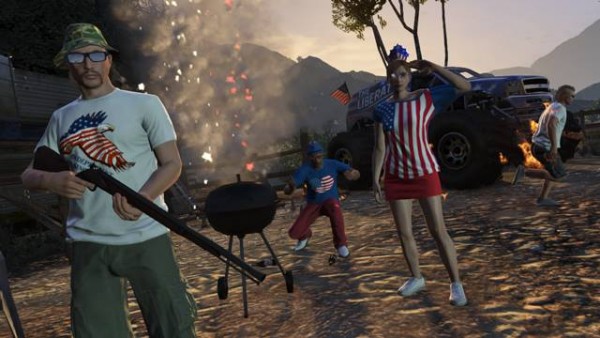 Grand Theft Auto gets patriotic
Grand Theft Auto gets patriotic
In the interests of efficacy, a great deal of politics in recent years has been professionalized. Experts devise policies, lobbyists make the case to politicians, politicians fight for legislation, and lawyers file lawsuits in the courts to either enforce or overturn regulations. On the level of pure results it is a strategy that has worked well for progressives: much of the tangible progress in working conditions, protecting the environment, and attaining civil rights for women, minorities, and, to a lesser extent, gays has come from this professional model of political change. Think, for example, of the lawyer-driven landmark ruling of Brown v. Board of Education in 1954 that desegregated schools, or the environmental litigation and policies of the early 1970s that paved the way for the Environmental Protection Agency. But this strategy has a cost: it has made the game of politics a bore. It has separated the ends—life, liberty, and the pursuit of happiness for all citizens— from the means: an insider’s game of reports, briefs, and bills. It has taken the game away from the very people for whom it is ostensibly being played.
Fashioning a politics that learns from and draws upon the popular attraction of video games means considering more than just end goals. Universal health care, free education, or a more equitable economy are worthy objectives. But we also have to give serious consideration to how we reach these targets—that is: how we do politics. We need to rethink progressive politics in terms of the quality of our gameplay. Perhaps one of the reasons progressive are not winning much these days is that lately our game isn’t much fun to play.
The intense pleasure gamers get out of playing video games suggest that if a game offers power, excitement, and the room to explore, people will play evening after evening after evening, almost regardless of the results. Perhaps the problem is not that people don’t want to get involved in politics, but rather that they don’t want to take part in a professionalized politics so interested in efficiency that there is no space for them, or they don’t want to spend time in a political world so cramped that there’s no freedom to explore and discover, to know or master. People don’t get involved in politics because the process, both figuratively and literally, does not involve them.
Making radical politics into a game that demands participation, allows for “players” autonomy, and is, above all, fun, is, perhaps ironically, exactly what is necessary to take winning seriously.
Read more here on progressive politics and video gaming here: http://tinyurl.com/ngz6hnf
(Skip to Chapter 3: Play the Game: Grand Theft Desire)


